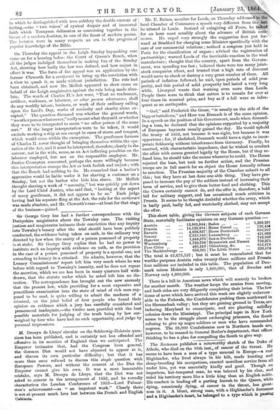On Thursday the appeal in the Leigh Sunday haymaking case
came on for a hearing before the Court of Queen's Bench, when all the judges indulged themselves in making fun of the Sunday Act, showing how badly the law was defined, and how unjust in effect it was. The form of the appeal was an application by the
farmer Cleworth for a certiorari to bring up the conviction with a view to quash it, as made without jurisdiction. The rule had been obtained, and now Mr. Mellish appeared to show cause on behalf of the Leigh magistrates against the rule being made abso- lute. The words of Charles IL's Act were, "That no tradesman, artificer, workman, or labourer, or other person whatsoever, shall do any worldly labour, business, or work of their ordinary calling upon the Lord's Day, works of necessity and charity alone ex- cepted." The question discussed was whether the general words, "no other person whatsoever," really meant what they said, or whether they were to be interpreted to mean " no other person of the same sort." If the larger interpretation were to be taken, it would exclude working a ship at sea except in cases of storm and tempest, which would come within the exemption. The gentlemen farmers of Charles H. never thought of bringing themselves within the ope- ration of the Act, and it must be interpreted, therefore, clearly in the narrow, not in the wide, sense, as an Act inflicting penalties on the labourer employed, but not on the responsible employer. Mr. Justice Crompton concurred, perhaps the more willingly because this interpretation stamps the Act as both foolish and unjust ; with that the Bench had nothing to do. He remarked that a barber's apprentice would be liable under it for shaving a customer on a Sunday, but not the barber who bids him shave. Mr Mellish thought shaving a work of " necessity," but was quickly put down by the Lord Chief Justice, who said that, " looking at the aspect of many gentlemen, it did not appear to be so." Each judge having had his separate fling at the Act, the rule for the certiorari was made absolute, and Mr. Cleworth's case—at least for that stage of the business—gained.


































 Previous page
Previous page